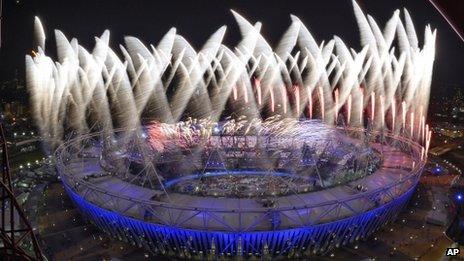Olympics: Closing ceremony 'party' details promised
- Published

Organisers hope the closing ceremony will emulate the success of the £27m opening ceremony
The Olympics closing ceremony will be "the best after-show party of all time", says its artistic director.
Kim Gavin said the ceremony, which will focus on 50 years of British music, would be a "mashed-up symphony".
Runner Mo Farah, bantamweight boxer Luke Campbell and canoeist Ed McKeever added to Team GB's gold medal haul on Saturday.
David Cameron has unveiled plans for competitive team sport to be compulsory in primary schools in England.
Commenting on Farah's double-Olympic glory after he won the 5,000 metres, Mr Cameron said: "Mo Farah is an Olympic legend and a true British hero. We can all be proud of his extraordinary achievement".
Ben Ainslie, the most successful sailor in Olympic history with four golds from four Games, will carry the flag for Team GB at the closing ceremony, the British Olympic Association have said.
The closing ceremony, which begins at 21:00 BST on Sunday, will see 3,500 performers in the stadium.
Called the Symphony of British Music, the event will showcase "British creativity in the arts" and take people on a musical journey from Elgar to Waterloo Sunset in 30 tracks, Mr Gavin said.
He explained that while the flags would process in, the athletes would come in as "friends" to form a "mosh pit" for the show.
More seats
Between 200 and 1,000 seats are to be put up for online sale on Sunday after the set has been moved into place.
George Michael has already confirmed his participation and the Spice Girls and Tinie Tempah are among acts reported to be performing.
Locog said the total cost of the four Olympic and Paralympic opening and closing ceremonies stands at £81m, with the opening ceremony costing £27m.
In other developments:
Locog said after the Paralympics, there will be an auction of equipment no longer required
Train companies say more than 800,000 extra seats will be provided on services across the network on Saturday, to help cope with increased passenger numbers
Jamaica's Usain Bolt won a third gold medal in the 4x100m relay
Luke Cambell beat Republic of Ireland's John Joe Nevin to take the bantamweight gold
Mexico beat Brazil 2-1 to win football gold at Wembley Stadium while Australia beat Team GB 3-1 to win hockey bronze
Poet Laureate Carol Ann Duffy has written a poem in praise of Britain's Olympic success, external. But she also has a swipe at bankers "filching our gold, our silver" and demands the return of school playing fields
Liam Heath and Jon Schofield won bronze in the men's kayak double 200m
Tom Daley won bronze for Britain in the men's 10m platform diving
The British women's 4x400m relay team missed out on a medal, finishing fourth
Team GB's Annie Last finished the mountain bike cross country in eighth place. France's Julie Bresset told the gold
In the final weekend of the Olympics, Team GB are seeking to boost their best medal haul for 104 years - Britain has so far won 62 medals, including 28 gold.
The team has already eclipsed its Beijing Olympics total of 19 golds and registered the best medal haul since the 1908 London Olympics.
Ed McKeever won Britain's 26th gold medal in the canoe sprint men's kayak single on Saturday.
Sunday, the final day of the Games, will see athletes compete for 15 gold medals in events including mountain biking, boxing and basketball.
Lord Coe chairman of Games organiser Locog was thanked by spectators as he toured the Olympic Park, with crowds shouting "brilliant Games" and telling him that he had done a "cracking job".
Meanwhile, Prime Minister David Cameron has said a draft new curriculum this autumn would require participation in sports such as football, hockey and netball.
But shadow education secretary Stephen Twigg said: "If David Cameron supports primary school sport, why did he abolish Schools Sports Partnerships which allowed primary schools access to coaches, staff and facilities to do competitive sport?"
Youth Sport Trust chairwoman Baroness Sue Campbell said it was "critical" teachers were given training and support.
On Monday, Heathrow is expected to see one of its busiest-ever days when thousands of athletes and officials leave the UK after the end of the Games.
- Published11 August 2012
- Published11 August 2012